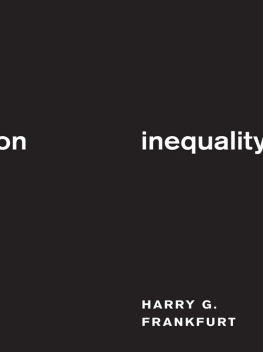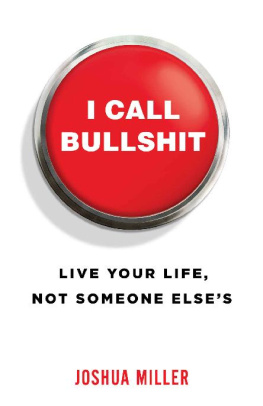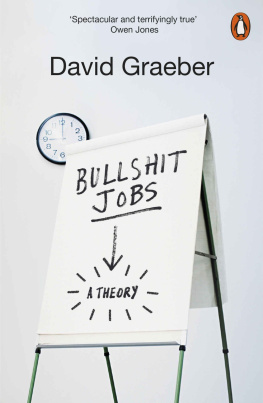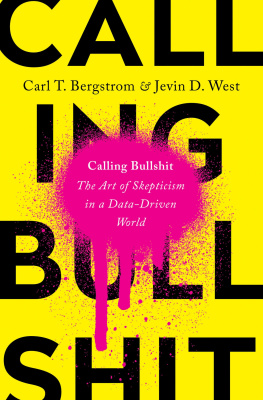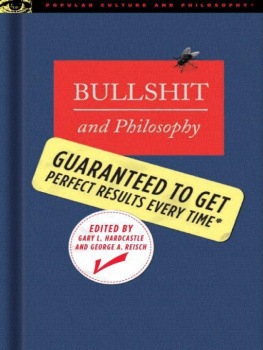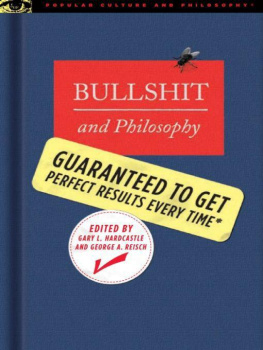Harry G. Frankfurt
On bullshit
Princeton University Press 2005
To Joan, truly
ON BULLSHIT
One of the most salientfeatures of our culture is that there is so much bullshit. Everyone knows this.Each of us contributes his share. But we tend to take the situation forgranted. Most people are rather confident of their ability to recognizebullshit and to avoid being taken in by it. So the phenomenon has not arousedmuch deliberate concern, or attracted much sustained inquiry.
In consequence, we haveno clear understanding of what bullshit is, why there is so much of it, or whatfunctions it serves. And we lack a conscientiously developed appreciation ofwhat it means to us. In other words, we have no theory. I propose to begin thedevelopment of a theoretical understanding of bullshit, mainly by providingsome tentative and exploratory philosophical analysis. I shall not consider therhetorical uses and misuses of bullshit. My aim is simply to give a roughaccount of what bullshit is and how it differs from what it is not, or (puttingit somewhat differently) to articulate, more or less sketchily, the structureof its concept.
Any suggestion aboutwhat conditions are logically both necessary and sufficient for theconstitution of bullshit is bound to be somewhat arbitrary. For one thing, theexpression bullshit is often employed quite loosely simply as a genericterm of abuse, with no very specific literal meaning. For another, thephenomenon itself is so vast and amorphous that no crisp and perspicuousanalysis of its concept can avoid being procrustean. Nonetheless it should bepossible to say something helpful, even though it is not likely to be decisive.Even the most basic and preliminary questions about bullshit remain, after all,not only unanswered but unasked.
So far as I am aware,very little work has been done on this subject. I have not undertaken a surveyof the literature, partly because I do not know how to go about it. To be sure,there is one quite obvious place to lookthe Oxford English Dictionary. TheOED has an entry for bullshit in the supplementary volumes, andit also has entries for various pertinent uses of the word bull and forsome related terms. I shall consider some of these entries in due course. Ihave not consulted dictionaries in languages other than English, because I donot know the words for bullshit or bull in any other language. Anotherworthwhile source is the title essay in The Prevalence of Humbug by MaxBlack. I am uncertain just how close inmeaning the word humbug is to the word bullshit. Of course, thewords are not freely and fully interchangeable; it is clear that they are useddifferently. But the difference appears on the whole to have more to do withconsiderations of gentility, and certain other rhetorical parameters, than withthe strictly literal modes of significance that concern me most. It is morepolite, as well as less intense, to say Humbug! than to say Bullshit! Forthe sake of this discussion, I shall assume that there is no other importantdifference between the two.
Black suggests a numberof synonyms for humbug, including the following: balderdash, claptrap,hokum, drivel, buncombe, imposture, and quackery.This list of quaint equivalents is not very helpful. But Black also confrontsthe problem of establishing the nature of humbug more directly, and he offersthe following formal definition:
HUMBUG: deceptive misrepresentation,short of lying, especially by pretentious word or deed, of somebodys ownthoughts, feelings, or attitudes.
A very similar formulation mightplausibly be offered as enunciating the essential characteristics of bullshit.As a preliminary to developing an independent account of those characteristics,I will comment on the various elements of Blacks definition.
Deceptivemisrepresentation : This maysound pleonastic. No doubt what Black has in mind is that humbug is necessarilydesigned or intended to deceive, that its misrepresentation is not merelyinadvertent. In other words, it is deliberate misrepresentation. Now if,as a matter of conceptual necessity, an intention to deceive is an invariablefeature of humbug, then the property of being humbug depends at least in partupon the perpetrators state of mind. It cannot be identical, accordingly, withany propertieseither inherent or relationalbelonging just to the utterance bywhich the humbug is perpetrated. In this respect, the property of being humbugis similar to that of being a lie, which is identical neither with the falsitynor with any of the other properties of the statement the liar makes, but whichrequires that the liar makes his statement in a certain state of mind namely,with an intention to deceive.
It is a furtherquestion whether there are any features essential to humbug or to lying thatare not dependent upon the intentions and beliefs of the personresponsible for the humbug or the lie, or whether it is, on the contrary,possible for any utterance whatsoever to begiven that the speaker is in acertain state of minda vehicle of humbug or of a lie. In some accounts oflying there is no lie unless a false statement is made; in others a person maybe lying even if the statement he makes is true, as long as he himself believesthat the statement is false and intends by making it to deceive. What abouthumbug and bullshit? May any utterance at all qualify as humbug or bullshit,given that (so to speak) the utterers heart is in the right place, or must theutterance have certain characteristics of its own as well?
Short of lying : It must be part of the point of saying that humbug is short oflying that while it has some of the distinguishing characteristics of lies,there are others that it lacks. But this cannot be the whole point. After all,every use of language without exception has some, but not all, of thecharacteristic features of liesif no other, then at least the feature simplyof being a use of language. Yet it would surely be incorrect to describe everyuse of language as short of lying. Blacks phrase evokes the notion of somesort of continuum, on which lying occupies a certain segment while humbug islocated exclusively at earlier points. What continuum could this be, alongwhich one encounters humbug only before one encounters lying? Both lying andhumbug are modes of misrepresentation. It is not at first glance apparent,however, just how the difference between these varieties of misrepresentationmight be construed as a difference in degree.
Especiallyby pretentious word or deed : There aretwo points to notice here. First, Black identifies humbug not only as acategory of speech but as a category of action as well; it may be accomplishedeither by words or by deeds. Second, his use of the qualifier especiallyindicates that Black does not regard pretentiousness as an essential or whollyindispensable characteristic of humbug. Undoubtedly, much humbug ispretentious. So far as concerns bullshit, moreover, pretentious bullshit isclose to being a stock phrase. But I am inclined to think that when bullshit ispretentious, this happens because pretentiousness is its motive rather than aconstitutive element of its essence. The fact that a person is behavingpretentiously is not, it seems to me, part of what is required to make hisutterance an instance of bullshit. It is often, to be sure, what accounts forhis making that utterance. However, it must not be assumed that bullshit alwaysand necessarily has pretentiousness as its motive.
Misrepresentationof somebody's own thoughts, feelings, or attitudes : This provision that the perpetrator of humbug is essentiallymisrepresenting himself raises some very central issues. To begin with,whenever a person deliberately misrepresents anything, he mustinevitably misrepresenting his own state of mind. It is possible, of course,for a person to misrepresent that alonefor instance, by pretending to have adesire or a feeling which he does not actually have. But suppose that a person,whether by telling a lie or in another way, misrepresents something else. Thenhe necessarily misrepresents at least two things. He misrepresents whatever heis talking abouti.e., the state of affairs that is the topic or referent ofhis discourseand in doing this he cannot avoid misrepresenting his own mind aswell. Thus, someone who lies about how much money he has in his pocket bothgives an account of the amount of money in his pocket and conveys that hebelieves this account. If the lie works, then its victim is twice deceived,having one false belief about what is in the liars pocket and another falsebelief about what is in the liars mind.
Next page

